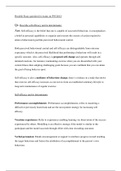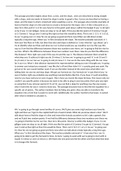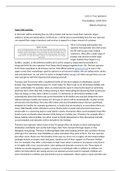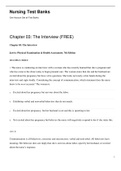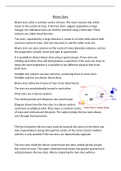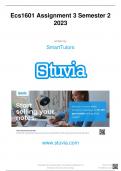Name of the Teacher Date Level of the class Length of lesson
Carien Fourie 31/7/2020 Pre-intermediate 60 minutes
Lesson Type:
Grammar
Lesson Topic:
Past Simple vs Present Perfect for life experiences – Grammar Point 1
Lesson Aims: Lesson Outcomes:
By the end of the lesson, students will be able to tell the difference between By the end of the lesson, students will have learnt to differentiate between
Past Simple and Present Perfect in the context of talking about past Past Simple and Present Perfect and use it appropriately in a conversation.
experiences.
Anticipated difficulties: Suggested solutions:
Pronunciation: Explain and show students:
o /h/ For students having difficulty pronouncing the “w” show how to round
o /vater/ vs. /water/ and unround mouths into an “o” to produce the correct sound.
Demonstrate the word by saying it first, then break is up in sections
with emphasis on the stress in the word.
Write the word on the board and repeat the saying of the word again.
Give Students mirrors to practice with, first on their own and then with
a partner
Disruptive and disengaged students Build positive relationship with the Students to understand background
to them attending the summer school.
Make a note of the Students that is not happy to be there and
continue to encourage them to take part in the activities.
Keep tasks fun and short to keep Students engaged.
Make use of a range of CCQ’s in relation to ensure the Students
grasp and understand the difference between Past Simple and
1 i-to-i LOVE TEFL Lesson Plan
, Challenges on choosing correct tenses Present Perfect tenses.
Prompt the form from the Students instead of giving it to them. This
will help to determine if there are any problems to attend to in more
detail.
Use guided discovery tasks that focus on problem areas and combine
that with positive error correction during the controlled practice of the
tasks.
Work in smaller groups
Shy vs overly confident students Pair shy Students with another Student that will make them feel
comfortable.
Try to have a strong Student in each group that will assist other
Students with tenses.
Positive reinforcement will be given throughout.
Target language analysis:
1. What is the use or function of this Use the past simple for past actions or events which have no connection to the present.
language? (include a timeline if Example: I travelled to New York last month.
appropriate)
Use the present perfect for actions which started in the past and are still happening now or for completed
actions that have a connection to the present.
Example: I have travelled to New York once before.
Past events with no connection to the future Actions that happened in the past and is still
happening or for completed actions with a
connection to the present
I travelled to New Your last month I have travelled to New Your once before.
Past Simple Present Perfect
2. In which context are you introducing I am introducing the target language in the context of past experiences of the Students in the Past Simple
the language? and Present Perfect tenses.
2 i-to-i LOVE TEFL Lesson Plan
, I will engage the Students to share information about places that they have travelled to with the
assumption that they have travelled outside their birth country at least once and or ask them to share past
experiences they enjoyed doing and still do.
3. Which concept checking questions will Understanding of the target language will be checked by asking specific questions that can be answered
you ask to ensure students understand in the Present Perfect or Past Simple tense.
the meaning?
The following CCQs will be asked:
1. Have you ever been to New York?
2. Have you ever been to the beach?
3. Have you ever been to the resort in the mountains?
4. When did you go to New York?
5. Did you play baseball when in New York?
6. Did you swim in the sea when you were at the beach?
Timelines will be drawn for both tenses near the related sentences.
The form of the tenses will be prompted and written down on the white board.
4. What is the form of the target Present Perfect:
language? (include positive, negative
and question forms if appropriate) Positive Form Negative Form Question Form
Subject + have or has + past Subject + have not or has not + Have or has + subject + ever +
participle verbs past participle past participle + ?
Examples: Examples: Examples:
“We have visited India two “He has not eaten Chinese food” “Has he ever eaten Chinese
times” “You have not played baseball” food?”
“He has learnt four languages.” “Have you ever played rugby?”
Past Simple:
3 i-to-i LOVE TEFL Lesson Plan
Carien Fourie 31/7/2020 Pre-intermediate 60 minutes
Lesson Type:
Grammar
Lesson Topic:
Past Simple vs Present Perfect for life experiences – Grammar Point 1
Lesson Aims: Lesson Outcomes:
By the end of the lesson, students will be able to tell the difference between By the end of the lesson, students will have learnt to differentiate between
Past Simple and Present Perfect in the context of talking about past Past Simple and Present Perfect and use it appropriately in a conversation.
experiences.
Anticipated difficulties: Suggested solutions:
Pronunciation: Explain and show students:
o /h/ For students having difficulty pronouncing the “w” show how to round
o /vater/ vs. /water/ and unround mouths into an “o” to produce the correct sound.
Demonstrate the word by saying it first, then break is up in sections
with emphasis on the stress in the word.
Write the word on the board and repeat the saying of the word again.
Give Students mirrors to practice with, first on their own and then with
a partner
Disruptive and disengaged students Build positive relationship with the Students to understand background
to them attending the summer school.
Make a note of the Students that is not happy to be there and
continue to encourage them to take part in the activities.
Keep tasks fun and short to keep Students engaged.
Make use of a range of CCQ’s in relation to ensure the Students
grasp and understand the difference between Past Simple and
1 i-to-i LOVE TEFL Lesson Plan
, Challenges on choosing correct tenses Present Perfect tenses.
Prompt the form from the Students instead of giving it to them. This
will help to determine if there are any problems to attend to in more
detail.
Use guided discovery tasks that focus on problem areas and combine
that with positive error correction during the controlled practice of the
tasks.
Work in smaller groups
Shy vs overly confident students Pair shy Students with another Student that will make them feel
comfortable.
Try to have a strong Student in each group that will assist other
Students with tenses.
Positive reinforcement will be given throughout.
Target language analysis:
1. What is the use or function of this Use the past simple for past actions or events which have no connection to the present.
language? (include a timeline if Example: I travelled to New York last month.
appropriate)
Use the present perfect for actions which started in the past and are still happening now or for completed
actions that have a connection to the present.
Example: I have travelled to New York once before.
Past events with no connection to the future Actions that happened in the past and is still
happening or for completed actions with a
connection to the present
I travelled to New Your last month I have travelled to New Your once before.
Past Simple Present Perfect
2. In which context are you introducing I am introducing the target language in the context of past experiences of the Students in the Past Simple
the language? and Present Perfect tenses.
2 i-to-i LOVE TEFL Lesson Plan
, I will engage the Students to share information about places that they have travelled to with the
assumption that they have travelled outside their birth country at least once and or ask them to share past
experiences they enjoyed doing and still do.
3. Which concept checking questions will Understanding of the target language will be checked by asking specific questions that can be answered
you ask to ensure students understand in the Present Perfect or Past Simple tense.
the meaning?
The following CCQs will be asked:
1. Have you ever been to New York?
2. Have you ever been to the beach?
3. Have you ever been to the resort in the mountains?
4. When did you go to New York?
5. Did you play baseball when in New York?
6. Did you swim in the sea when you were at the beach?
Timelines will be drawn for both tenses near the related sentences.
The form of the tenses will be prompted and written down on the white board.
4. What is the form of the target Present Perfect:
language? (include positive, negative
and question forms if appropriate) Positive Form Negative Form Question Form
Subject + have or has + past Subject + have not or has not + Have or has + subject + ever +
participle verbs past participle past participle + ?
Examples: Examples: Examples:
“We have visited India two “He has not eaten Chinese food” “Has he ever eaten Chinese
times” “You have not played baseball” food?”
“He has learnt four languages.” “Have you ever played rugby?”
Past Simple:
3 i-to-i LOVE TEFL Lesson Plan



